Community Organizing 101.1: Wrestling With Power
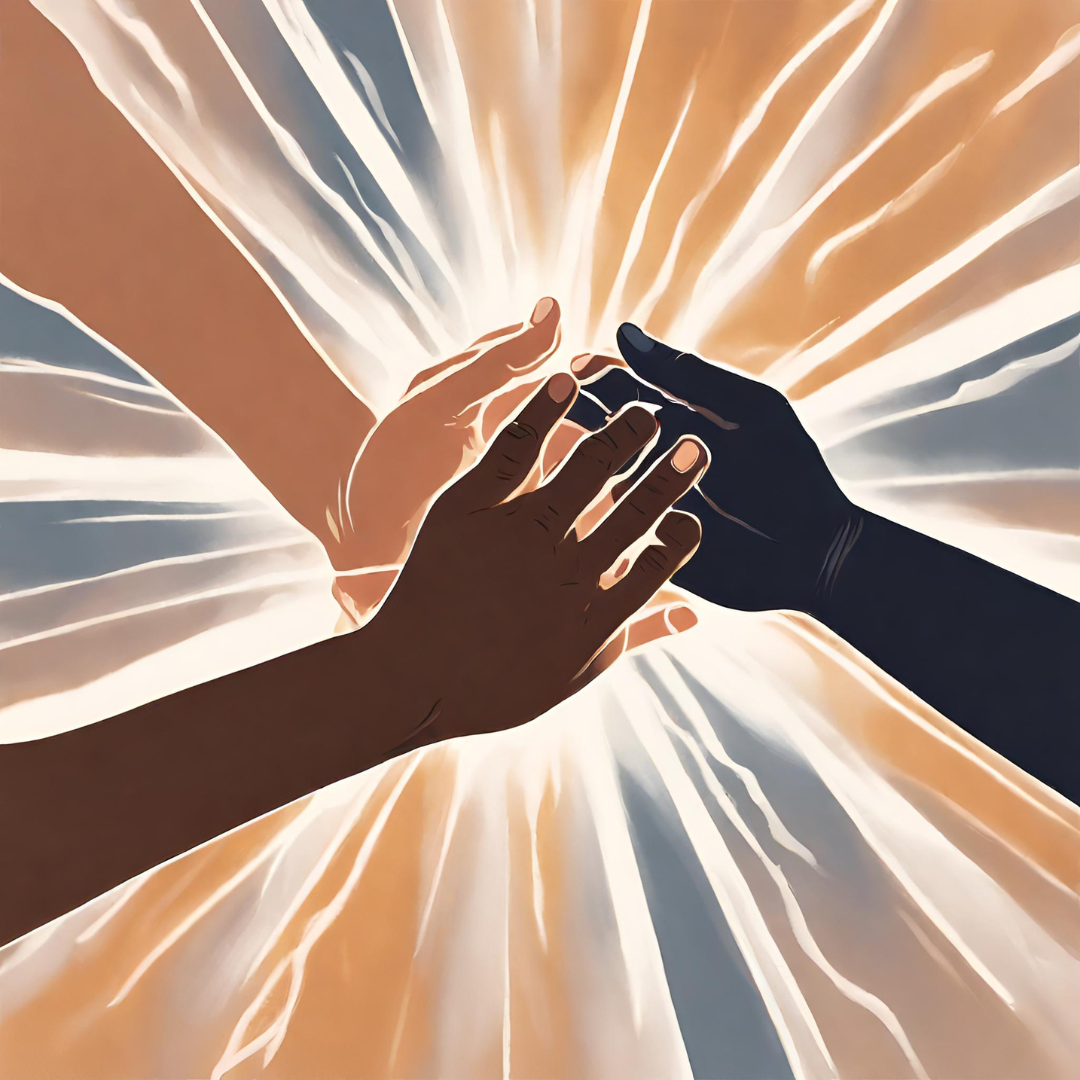
Regardless of the path that leads us into the work of social justice and community organizing, I have found in my experience that the first steps we take into this work inevitably force us to reckon and wrestle with our understanding of —and subconscious reactions to— the concept of Power.
I want you to pause for a second as you read this and think about (even jot down, maybe) the first thoughts, emotions, and reactions that surface for you when think of “power.”
- Do particular people come to mind for you? Who? Why? Is it because of their “titles"? Their actions? Their impact?
- Perhaps there are particular phrases that pop up for you.
- Think about particular dynamics that come to mind. Think about how you recognize power, about the traits that you associate with it.
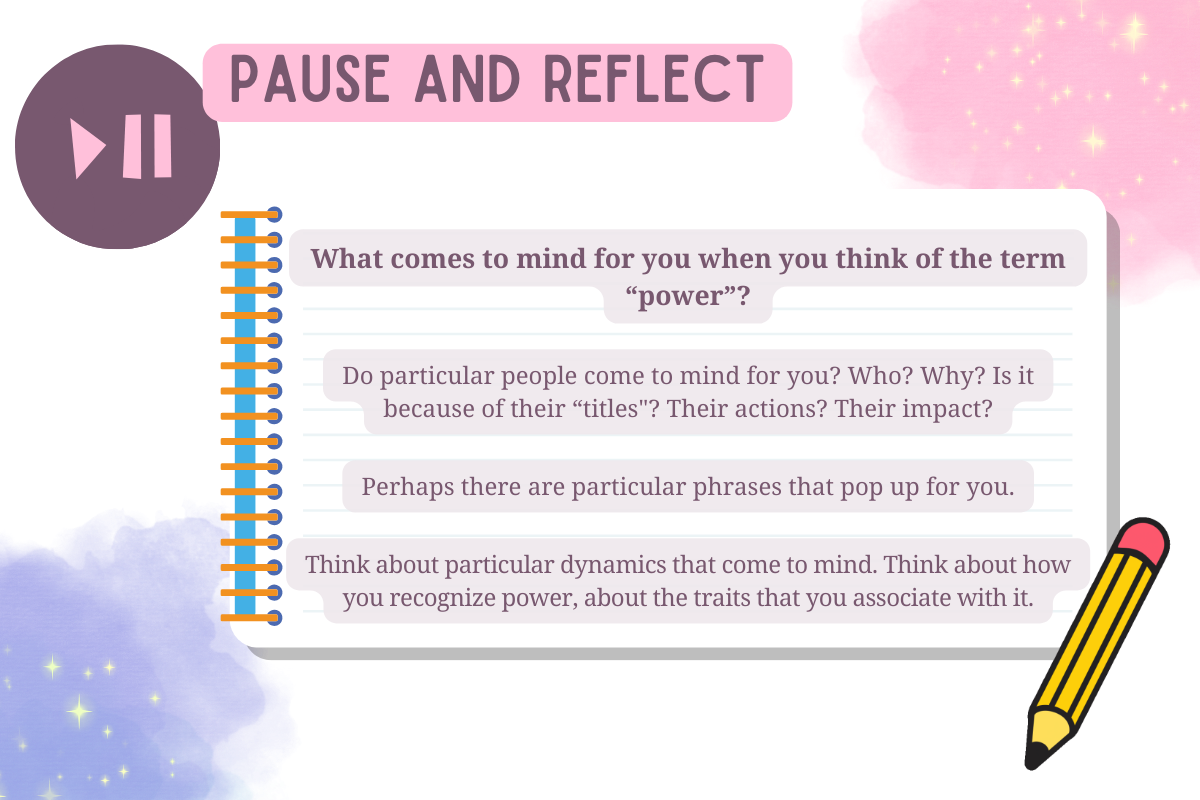
I’ve asked this question during my live trainings in the past and some of the most common responses I’ve heard from folks are:
- Money
- Influence
- Corruption
- The President
- The CEO
- Corporations
- The 1%
- Force, coercion, control
More often than not, the first associations that come to mind are negative in one way or another — maybe you notice this in the reactions that surfaced for you. These reactions prompt some follow-up questions:
Why do we associate power with a bad thing? Where do we learn that power is a bad? Who teaches us that message? How much of our perception of power is influenced by our position and identity under The Culture(TM) of White Supremacist Capitalism? How might experiences with power — and conversely, oppression — look different for folks of different races, classes, genders, sexualities, and so on? How much of your own reaction to power is influenced by these experiences for you?
Don’t get me wrong, not every response shared carries this ominous vibe. Some folks tap into and share more positive examples, although they are much less frequent to hear:
- People power
- Voting
- Knowledge
It’s easy to understand why these positive associations with power aren’t as common. To use myself as an example, I am writing this from the perspective of a 30 year old white woman who was raised poor and has continued to float among the “working class” my entire life. My own experiences with power have been shaped by my own struggle with feeling like I don’t have the ability to…
- pay my bills
- maintain stable housing
- go to the doctor
- influence my fate
This struggle ingrained a message that I don’t have power, which I have since re-learned (through organizing!) to be a message that is both (1) completely untrue, and (2) a mindset shared by most of my peers.
That brings me to the Big Mama of the Questions:
Who benefits from us inheriting these perceptions of power?
What is power, REALLY?
I am a linguistics nerd (fun fact that many of you probably didn’t know about me, one of my undergraduate degrees is in Spanish Language and Literature). So let’s take a look at the true definition of power, and break down the word itself, and with it, the limitations that we inherited to prevent us from building power.
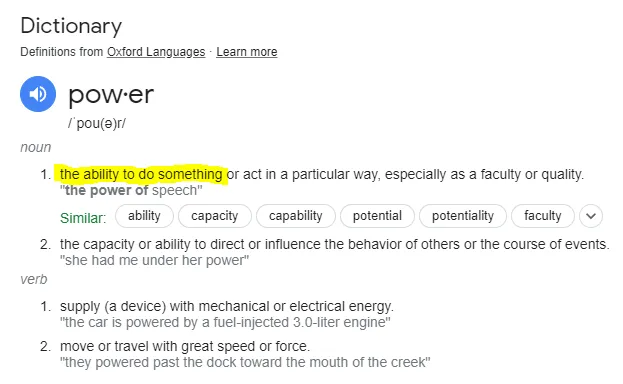
If you google “define power,” you’ll receive the following definitions:
- The ability to do something or act in a particular way, especially as a faculty or quality.
- the capacity or ability to direct or influence the behavior of others or the course of events.
Honestly, these definitions are pretty on point. The simplest way to think about power is as “the ability to do something.” The ability to do, totally neutral in its implications, although not neutral in its impact. Just like power in the electrical sense of the word: nuclear power has been used to generate electricity for entire communities, and it has been used to expand violence for colonial oppression.1
This neutrality at the core of the term “power” can even be observed when we break down the word itself and trace its roots back to Middle English from an alteration of the Latin “posse,” meaning ‘be able.’
To go one step further with this analysis, the Spanish word for the noun “power” is “poder,” which ALSO happens to be the unconjugated form of the verb, ‘to be able to.’ Since it’s a verb it gets used in sentences like ‘I can survive’ (yo puedo sobrevivir) and ‘you can pay rent’ (tu puedes pagar el alquiler). This, to me, is the clearest example of how power can be applied in different situations and have an impact that can be both/either positive or negative as a result.
The ability to survive is a form of power. The ability to pay rent is a form of power. The ability to go to work, to care for our kids, to keep the lights on. Those are all forms of power. Power that is being taken by as us the result of how others are choosing to use their power in the form of: the ability to exploit our labor, the ability to extract from our Earth, the ability to profit off of human necessities. How we choose to use our power, and how others choose to use their power, is part of this grand web of interconnectedness under The Culture(TM).
Let’s return to our Big Mama question, Who benefits from us inheriting these perceptions of power? When we perceive power as inherently bad, or inherently corrupt, or some other thing that makes us want to avoid it and run from it, then we are ultimately surrendering the power that we have to enact positive impacts for ourselves and our communities.
To answer my own question, it benefits the people who currently HAVE power. It benefits the people who use power in ways that harm us, our families, our neighbors. It benefits them when we stay small and powerless.
That’s why we start with this concept at the heart of organizing, because we have to know what we’re up against and what we’re trying to build together if we want to win the change we envision.
We aren’t organizing against power, we’re organizing against POWERLESSNESS.
Recognizing Powerlessness
In order to organize against powerlessness at large, we have to start with the powerlessness within ourselves. Let’s start with a little bit of self-reflection when it comes to the way that we relate to power. Everybody has a different reaction to power, based on how they’ve experienced power in their lives so far, and how they’ve been impacted by the ways that it currently manifests in our society.
The Culture(TM) nurtures power dynamics that trigger most of us to have a reaction in situations where we are given the opportunity to step into power, or to confront power. Think back on an instance in your life, where you’ve had the chance to claim your power or confront someone else’s: the chance to speak up against oppression, the chance to take a leadership position of some kind. What emotions came up for you in that moment? What thoughts and messages? What sensations did your body experience?
Typically, our reactions fall into one of five categories. We all borrow from each of these five categories at various times, but we tend to fall more into one than the others:2
- The Lone Wolf – When it comes to power, this person has a lot of great ideas, but doesn’t always work well with others. They might get impatient, or feel like they can’t count on others to do the work, and so they try to carry out the work all by themselves. The message shows up as “I can do it all by myself!” or “I’m the only one.”
- Hiding in the Weeds - This person would prefer not to be in the spotlight, and generally wants to avoid direct conversation. They’re here to take on whatever work you need them to do behind the scenes, and to help out… as long as they can hide in their corner, otherwise. The message often shows up as “fear of conflict” or the “right to comfort.”
- Self-Proclaimed I-Don’t-Know-It-All - This person insists that they don’t know enough to play a role, to contribute to conflict, or to be a leader. They second guess their own strength, power, and knowledge. The message often shows up as “worship of the written word,” and “perfectionism.”
- The Chaos Creator – This is a person whose “fight” response tends to kick in during high-stress moments, and they attempt to manage power dynamics without managing their own nervous systems first. They tend to take over and try to get others to mold to their vision with aggression and domination. The message often shows up as “my way or the highway.”
- The Victim – This is the person who shows up with powerlessness from the jump, and tends to default their focus to all the ways that they don’t have power, influence, or control of a situation. The message often shows up as “either/or” thinking.
Throughout this series on community organizing, you’ll find that I invite you to pause and participate in reflection multiple times in each piece. Self reflection is an underemphasized, and FOUNDATIONAL piece of organizing. So much of organizing the communities around us requires us to be familiar with ourselves, and to be working on healing the ways in which we have been harmed by The Culture(TM), and to unlearn the ways that we have been taught to harm others.
If you have the time and mental/energetic capacity, I would definitely encourage you to take some time to reflect more on these categories and your own reactions to power. It is through this reflection that we start to recognize opportunities to heal our own relationship to power.
- First, why do you think that is your reaction in the face of power? (Where did you learn this growing up? What stories have you been told that makes you act like this? What are we told now in society that reaffirms that story?)
- Second, what is the cost of reacting to power in this way? As in what are the consequences of not building power because of these reactions? What are the consequences for you personally? For your community? For the rest of us?
- Lastly, if we know that there are consequences to reacting to power in this way and it ultimately isn’t serving us… then why do we keep engaging in these behaviors? Usually that means that we are getting something out of it, no matter how small. We have to ask ourselves: what are we getting out of these behaviors?
- Is it that we get to avoid responsibility?
- That we get to blame others when things go wrong?
- That we get to avoid tension, conflict and struggle?
Something else?
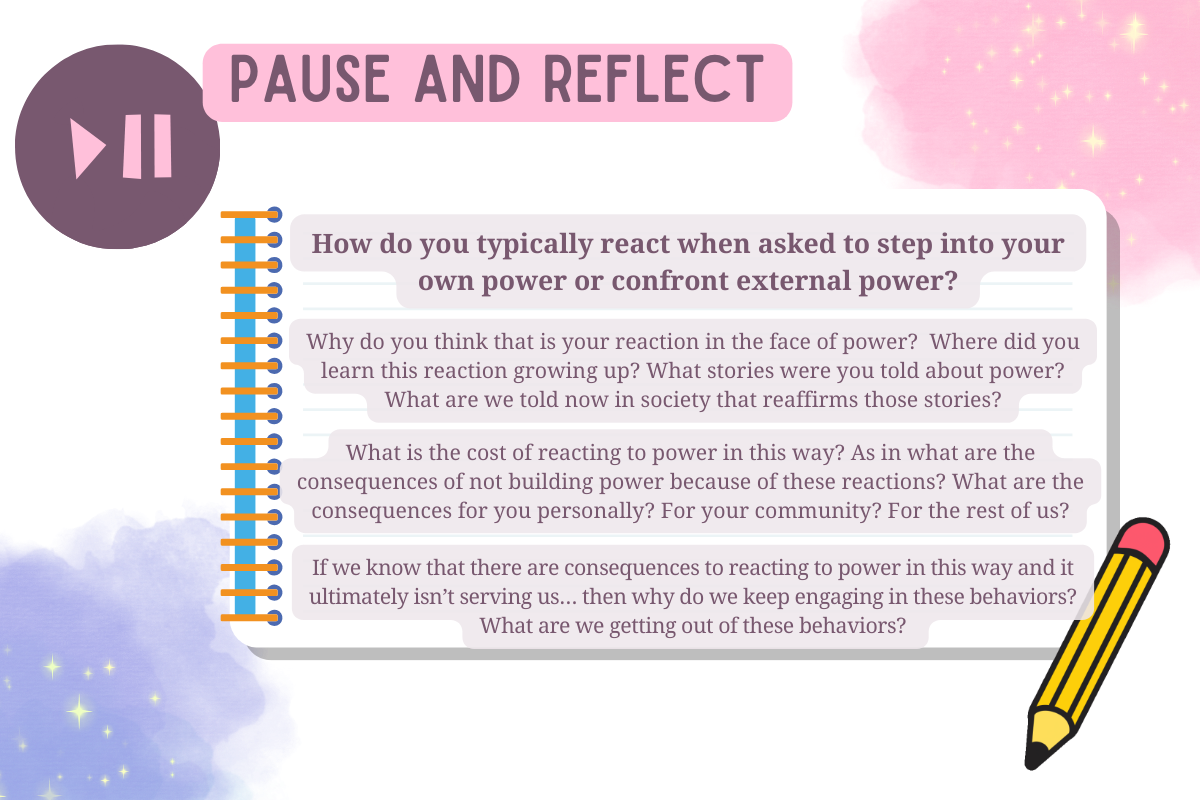
“Monolithic Power” aka “Power Over”
It is not surprising that so many of us have negative reactions to the concept of power, considering our primary exposure has been limited to one type of power: Monolithic Power, also referred to as “Power Over.” It isn’t the only type of power that exists, but The Culture(TM) of White Supremacist Capitalism works incredibly hard to make everyone believe that it is.
This kind of power is the power that we experience in our everyday lives, in hierarchies and pyramids where power is being executed over one person or another.
- Landlords using power over renters to commodify housing (a basic human need)
- Corporate owners and executives using power over workers to exploit their labor
- Politicians using power over people to pass unjust laws
- Rich individuals using their power over politicians to influence the outcomes of the collective
- Law enforcement using power over civilians to maintain complicity
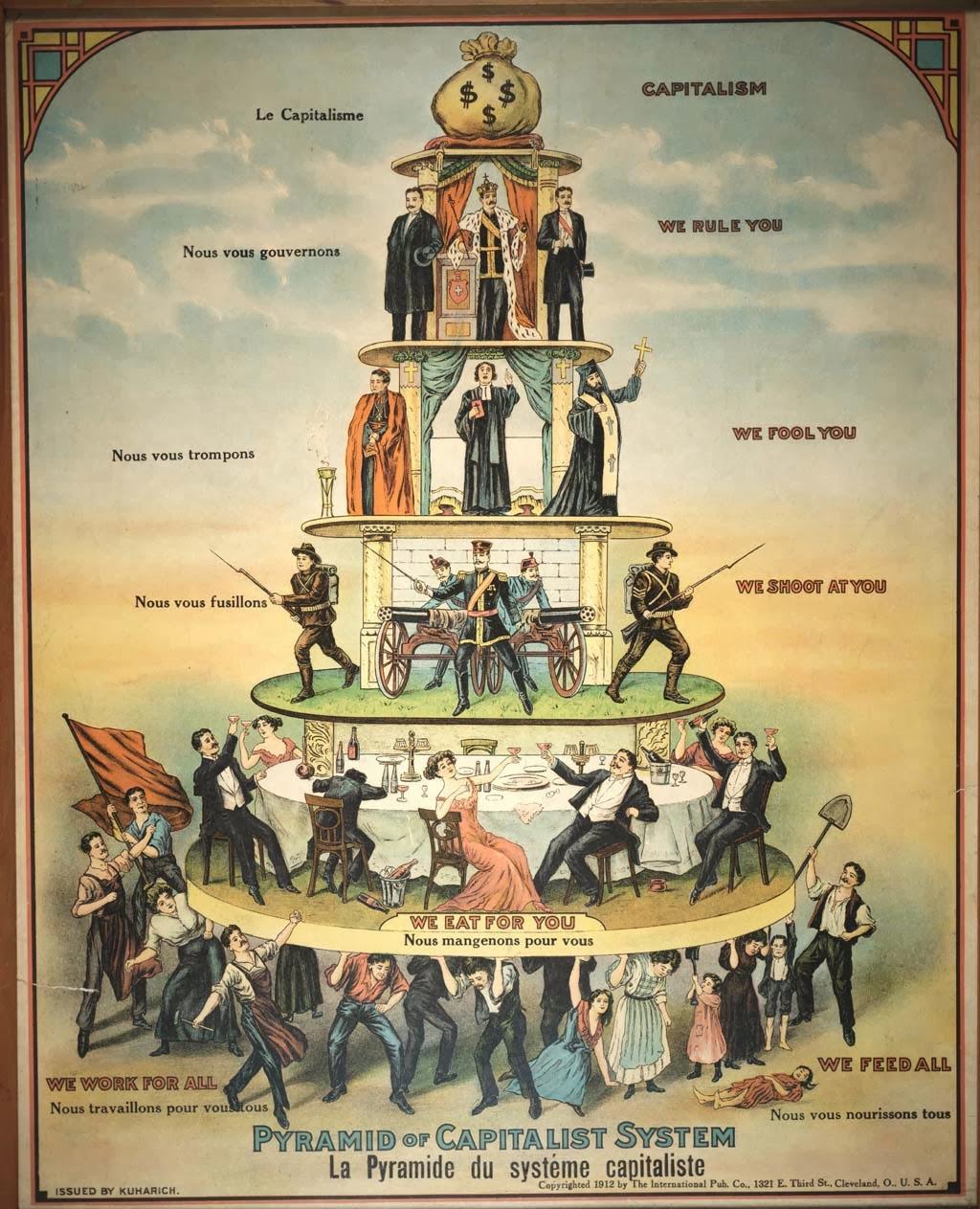
We are used to seeing power in the hands of white, cisgender, heterosexual, Christian, affluent, men. We are used to seeing people get power through lying, buying, threatening, forcing, and stealing it. We experience their power in our lives as poverty, addiction, homelessness, minimum wage paychecks, working 3 jobs to make it by, overwhelming student loans, a dying environment, and so on.
A question worth reflecting on: How do you experience this power in your life?
As a result of experiencing power in this shape, we start to believe that the only way to get power is to get to the top, and that the only way to change our current reality is to change whoever is at the top. This changes the whole dynamic of organizing, maintains the focus outside of ourselves as the majority, and centers our organizing in the framework of Power Over, replicating the very same culture that we seek to organize against.
The Three Faces of Power Over
Power Over puts on three different faces to maintain its supremacy.
“Visible” Power Over is all the stuff that was just described, the stuff that is in your face and obvious. It’s the visibility of the Bosses, the President, the landlords.
The second flavor is “Hidden” Power Over.
This is the stuff that happens behind closed doors, that we all know about even though it isn’t happening out in the open. We could think of this as all the corporate lobbyists paying off politicians, perhaps. Or maybe, the negotiations that happen over dinner and lead to promotions. We might consider another example to be rich people who buy their innocence after committing crimes.
The third flavor is “Invisible” Power Over.
Take a look at this picture and jot down a few thoughts on what you see happening in this image.
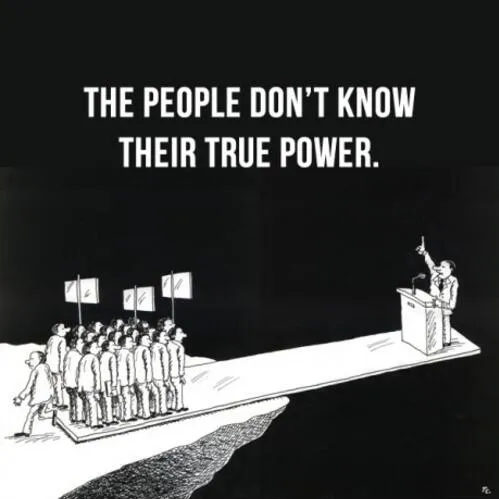
I’ll tell you what I see, although maybe you make some different observations, and that’s great. Starting on the left, I see a group of people all standing together on a plank of some kind, which is on top of a piece of Earth that looks like the edge of a cliff. There’s one lone individual stepping off the plank and onto the Earth behind the rest of the group, which stands facing the opposite direction with expressionless faces, although a few of them are holding up signs and we can’t see what the signs might say. The plank they stand on extends beyond the edge of the cliff, and on the opposite end, hanging over the empty space, stands one person behind a podium with a microphone who is waving a finger in the air. He appears to be preaching, leading, or speaking to the group.
Now, I want you to pause for just another second and reflect on the scene in this image and all the possibilities, and the ways that it relates to our current reality. Maybe sit with these questions:
- What happens if only the one person steps off the plank and no one joins them?
- What happens if one or two people in the group join the person who is stepping off, but the rest of them stay on the plank?
- What happens if EVERYONE in the group steps off the plank together?
- If the people in the group are unhappy, why don’t they all just step off the plank? What’s holding them back?
Consider your answers to these questions and how they might translate to the world around us.
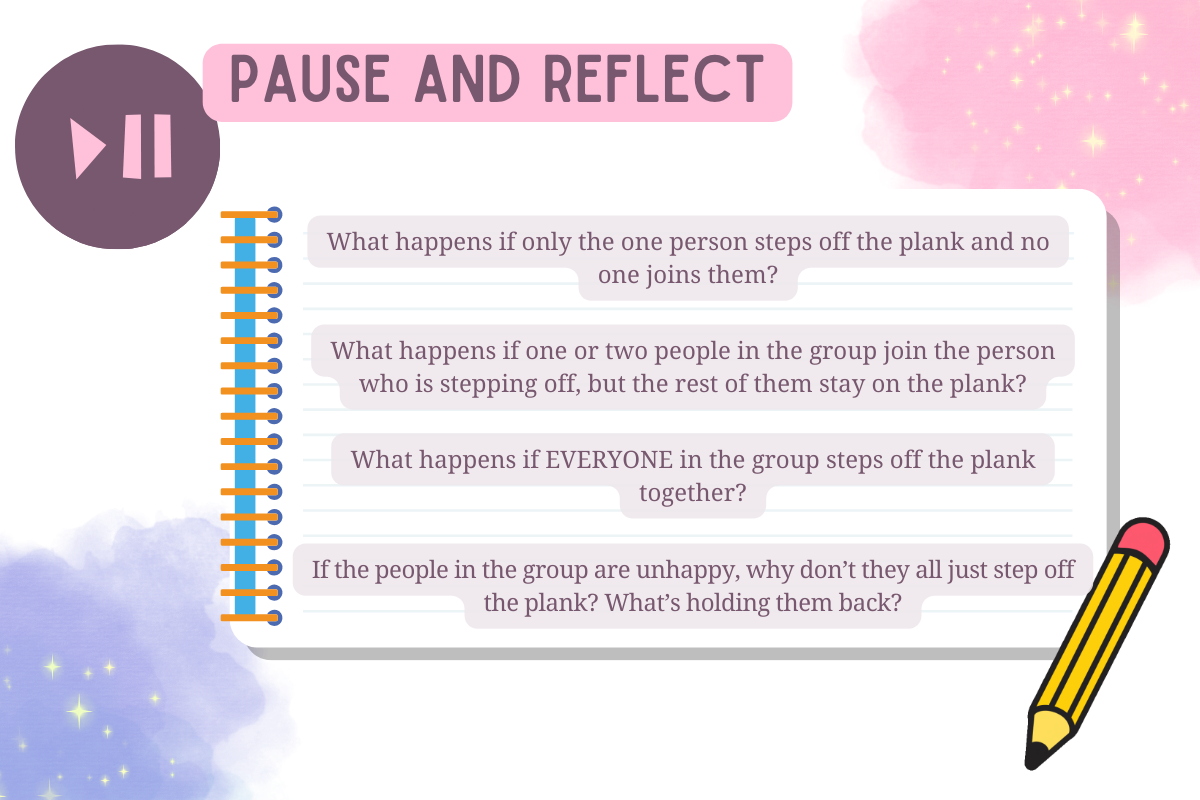
Power Over demands that there must be someone “under” the thumb of power. WE are the ones who hold up the current system, at the bottom of the pyramid, on the other side of the plank. If we are all so unhappy with the current version of events, then what’s holding us back from coming together, from stepping out from underneath these forces?
That’s the question that our organizing work has to answer if we are going to be successful.
People don’t step out from under oppressive systems because:
- They are exhausted by simply trying to survive
- They are kept busy working three jobs so they don’t have the time to look around
- They have been threatened with the empty void below the cliff if they don’t comply with the status quo
- They are isolated and divided by the person at the podium
- And so many more reasons
The truth is that those in power truly understand how power works and they know that there are many more of US than there are of them. This forces them to do everything that they can think of to prevent us from seeing the truth, from coming together and fighting back to reclaim a different version of power. They keep us divided, they keep us struggling, they keep us tired, and isolated. They take our history, our culture, our hope.
They know that if they keep us in survival mode, feeling isolated, and blaming each other for our problems that no one would pay attention to what is actually happening… and that’s where the racial division and other forms of “Invisible” Power flexing come into play with oppression and white supremacy culture that are necessary for maintaining The Culture(TM) of power that is profitable for the few at the expense of the many.
If our organizing is to be successful, we have to be prepared to for our organizing to be met with not just Visible Power Over, but also Hidden and Invisible Power Over.
Stay tuned for the next segment, where we will dig more into “Invisible” Power Over and the history behind The Culture of White Supremacist Capitalism.
1 U.S. Department of Energy. (n.d.). Beyond Oppenheimer: How nuclear weapons and nuclear reactors are different. Office of Nuclear Energy. Retrieved Jan 31, 2024, from https://www.energy.gov/ne/articles/beyond-oppenheimer-how-nuclear-weapons-and-nuclear-reactors-are-different
2 This framework of the 5 Reactions to Power was borrowed from the Campaign Manager Training Program hosted by Renew US in 2022


